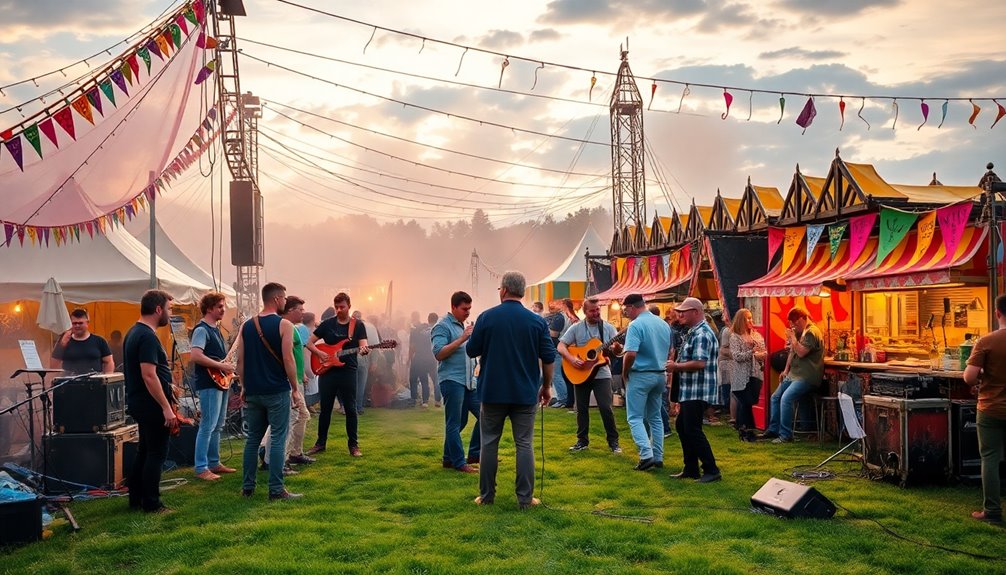Behind the scenes, Glastonbury Festival's legendary magic comes from a blend of rich history, diverse performances, and meticulous organization. From the expansive natural landscape to iconic stages like the Pyramid Stage, every detail enhances the experience. Logistics operate like a small city, ensuring smooth connectivity. Sustainability initiatives also play a crucial role in its charm. As you explore more, you'll discover the fascinating elements that shape this unforgettable event.
Key Takeaways
- The festival's unique location features a natural auditorium, enhancing the acoustic experience around the iconic Pyramid Stage.
- A temporary infrastructure operates like a small city, ensuring connectivity and logistics for over 200,000 attendees.
- Sustainability initiatives, including 100% fossil fuel-free production and extensive recycling, set a standard for environmental responsibility at festivals.
- Artistic expression is celebrated through diverse performances and interactive installations, fostering connections among attendees and inviting self-exploration.
- Legendary performances by artists like David Bowie and Beyoncé have shaped the festival's cultural impact and legacy in the music industry.
The Expansive Landscape of Glastonbury Festival
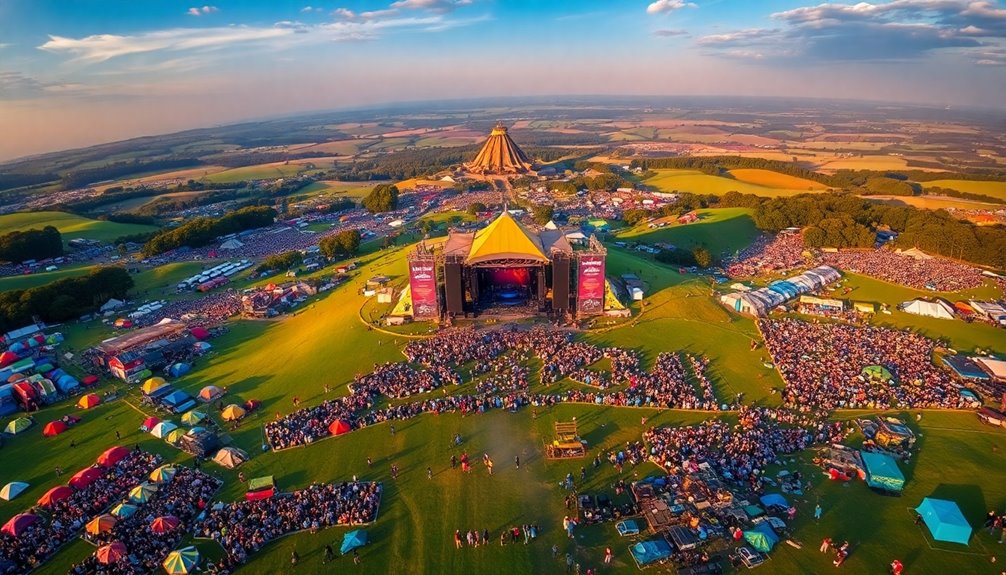
Have you ever wondered what makes the landscape of Glastonbury Festival so captivating? Nestled in the rural area near Pilton, this 900-acre site boasts a stunning backdrop of Glastonbury Tor and lush agricultural land. The festival's natural auditorium, created by gentle slopes, enhances the experience as you gather around the iconic Pyramid Stage, inspired by the Giza pyramids. You're just a short drive from urban hubs like Bristol and Bath, with easy access via major roads and the M5 motorway. As you explore, you'll discover diverse areas like The Green Fields and Shangri-La, each offering unique aesthetics and activities that enrich your festival experience, all while surrounded by the serene beauty of rivers and quaint settlements. The Green Fields is known as the heart of the festival, showcasing ecological awareness and sustainability through its various activities.
A Rich History of Music and Culture
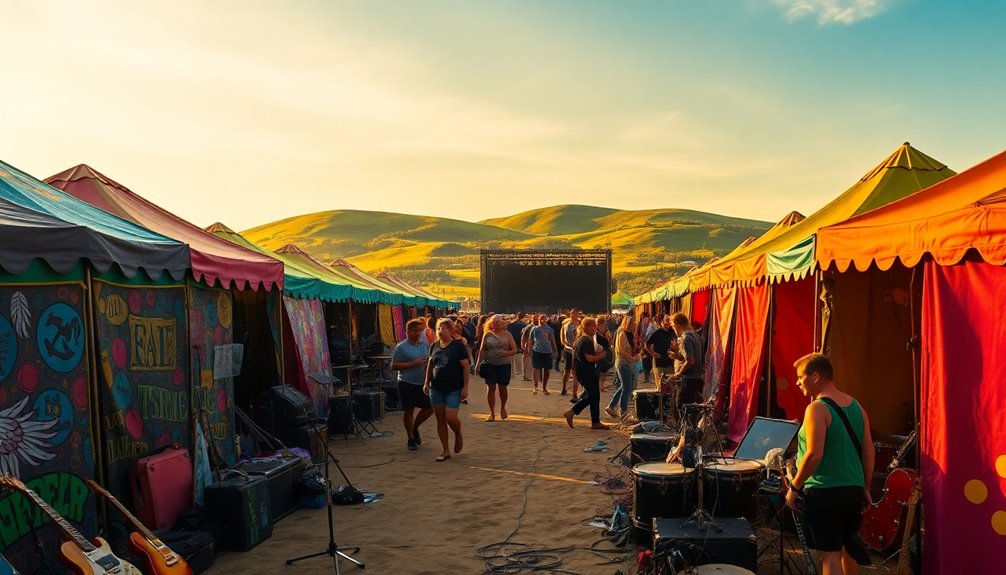
Since its inception, the Glastonbury Festival has evolved into a cultural phenomenon, intertwining music, art, and community spirit.
Beginning as the Pop, Blues & Folk Festival in 1970 with just 1,500 attendees and a £1 ticket, it quickly gained momentum, inspired by an open-air concert featuring Led Zeppelin.
The original lineup showcased artists like Tyrannosaurus Rex and Al Stewart, setting the stage for its rich musical history.
By 1971, the festival embraced a countercultural ethos, offering free attendance and aligning with the summer solstice. The first Pyramid Stage was introduced in 1971, becoming an iconic symbol of the festival's evolving landscape.
Over the years, Glastonbury has celebrated diverse performers, fostered community engagement, and supported charitable causes, all while maintaining its mystical reputation and spirit of inclusivity.
Iconic Performances That Shaped the Festival
When you think of Glastonbury, it's impossible not to recall the iconic performances that have defined its legacy.
From David Bowie's dream set in 2000, showcasing his greatest hits, to Beyoncé's groundbreaking 2011 headlining act, each performance has left an indelible mark. Stormzy's historic moment as the first black British solo artist to headline in 2019 further emphasized the festival's commitment to diversity and representation.
Radiohead's legendary gigs, especially their 1997 show despite technical issues, remain unforgettable.
Paul McCartney paid tribute to George Harrison in 2004, while Iggy & The Stooges brought chaos in 2007 with a stage invasion.
Jay-Z's 2008 set broke barriers as he became the first rapper to headline.
These moments, along with Adele's emotional connection in 2016 and the Foo Fighters' energetic shows, are what make Glastonbury a cultural phenomenon.
Navigating the Challenges of Organizing a Major Event
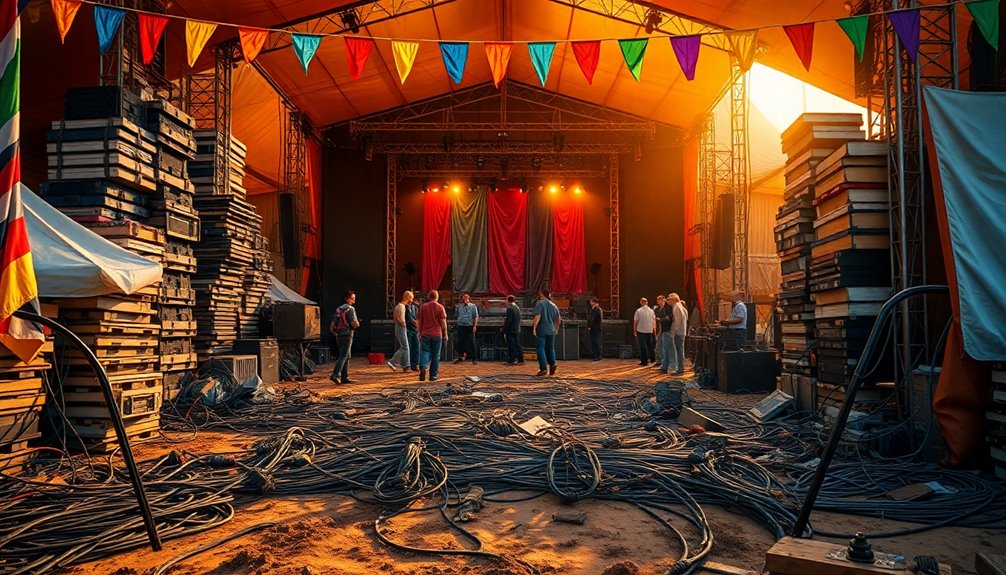
Organizing a major event like Glastonbury presents a unique set of challenges that require careful planning and execution. You'll need to address environmental concerns by implementing sustainable initiatives, like using biodegradable materials and hiring eco-conscious vendors. Effective waste management is crucial, so deploying clearly labeled bins throughout the site can make a difference. Engaging attendees in sustainability practices, such as the Worthy Pledge, fosters a collective effort. Additionally, managing logistics requires you to select energy-efficient venues and explore alternative transportation methods. Balancing ticket pricing with financial sustainability is essential too, especially considering the festival's nearly 500,000 attendees.
The Importance of Infrastructure and Logistics
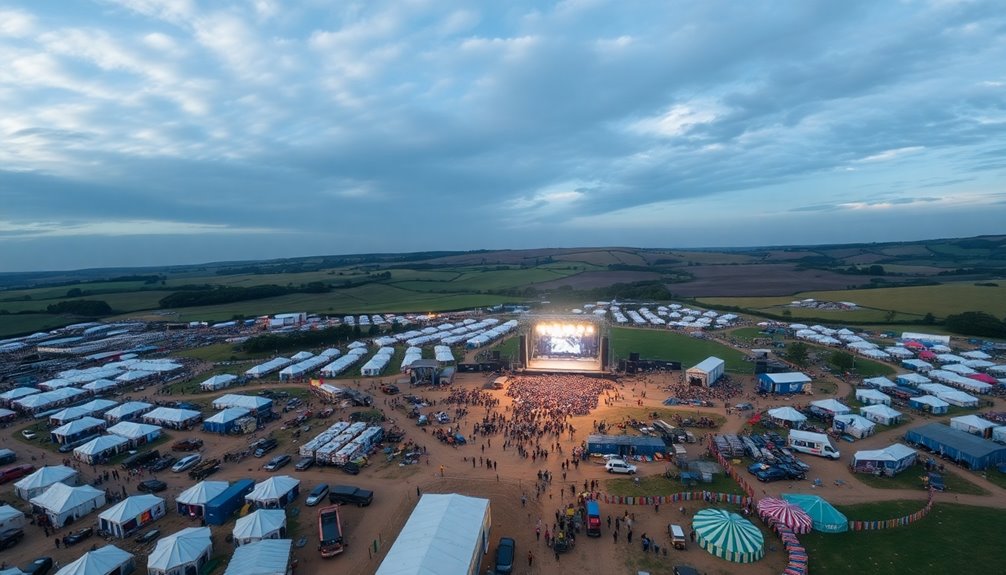
Infrastructure and logistics play a crucial role in the seamless execution of the Glastonbury Festival.
You'll find that the temporary network infrastructure operates like a small city, ensuring connectivity with high-capacity microwave links. Network usage at the festival is expected to exceed 80 terabytes, a significant increase from previous years.
The impressive IICON stage, standing 21 meters tall, showcases the massive scale of stage construction, which begins months in advance.
With over 1,111 toilets, including innovative composting options, the festival prioritizes sustainability.
A dedicated team manages these facilities, using sawdust to minimize environmental impact.
Coordinating the transportation of equipment involves a fleet of over 4,000 vehicles, tackling delivery challenges with precise planning.
Every detail, from stage setup to waste management, contributes to the festival's legendary experience, making infrastructure and logistics essential to its success.
Economic Boost and Cultural Significance
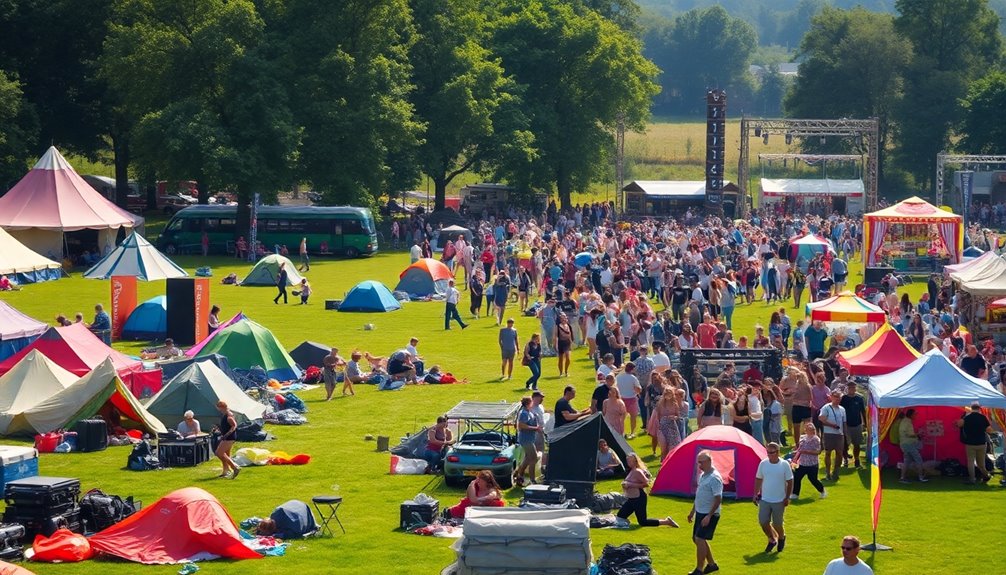
The Glastonbury Festival isn't just a remarkable feat of logistics; it also delivers a significant economic boost and serves as a cultural landmark.
In 2023, the festival generated about £168 million for UK businesses, with £32 million directly benefiting local Somerset enterprises. The extensive staging costs of around £62 million supported over 1,100 jobs across the UK, enriching the community with 325 jobs in Somerset alone. Additionally, the festival's operations involved over 1,750 individuals who worked directly to ensure everything ran smoothly.
As a cultural icon, Glastonbury attracts a global audience, fostering intercultural dialogue and celebrating local traditions. Festival-goers spent an estimated £1.6 million in Somerset, enhancing the local economy.
The festival's charitable contributions also resonate widely, demonstrating its commitment to community engagement and support for various causes.
The Evolution of Ticketing and Attendance
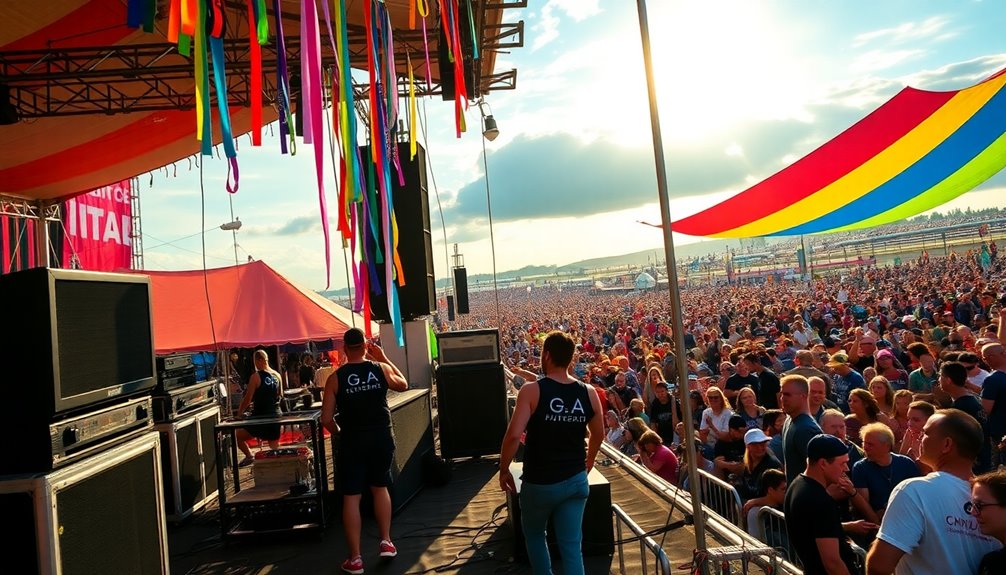
Glastonbury Festival's ticketing and attendance have transformed dramatically since its humble beginnings.
In 1970, you could snag a ticket for just £1, but by 2025, you'll need to shell out £373.50 plus a booking fee. Attendance has skyrocketed from 1,500 in its inaugural year to a staggering 175,000 for the 40th anniversary.
The ticketing process has also evolved; early fans bought tickets by post or at select record shops, while today, you purchase them online with a new queue system to handle demand.
With a mandatory £5 booking fee and a resale option, navigating ticket sales has become more complex but efficient, ensuring you have a chance to be part of this legendary festival.
Embracing Sustainability and Social Awareness

As awareness of environmental issues grows, festivals like Glastonbury have taken significant steps to embrace sustainability and social responsibility.
In 2023, you'll find the festival powered entirely by renewable energy, utilizing solar PV arrays and biogas plants. They've banned single-use plastic bottles and disposable vapes, ensuring food packaging is compostable. Additionally, the festival operated with 100% fossil fuel-free sources for all production areas, showcasing their commitment to sustainability.
The on-site recycling facility hand-separates waste, while over 40,000 attendees opt for public transport each year.
Glastonbury's Green Fields area has long championed environmental awareness, inspiring you to adopt eco-friendly behaviors. The 'Love the Farm' initiative encourages responsible resource use, and since 2000, more than 10,000 native trees have been planted, enhancing local biodiversity.
These efforts not only minimize waste but also set a standard for other festivals.
Creating an Unforgettable Atmosphere for Attendees

While you wander through the festival grounds, the enchanting atmosphere captivates your senses, drawing you into a world where creativity and music intertwine.
Each unique zone bursts with character, thanks to vibrant feature lighting and architectural highlights like the iconic Pyramid Stage. As you stroll through immersive pathways and light tunnels, the mood shifts from relaxed to energetic, perfectly matching the performances. This magical experience echoes the transformative power of monstrosity in media, inviting attendees to explore their own identities through artistic expression. The festival's design draws inspiration from community engagement, fostering a sense of belonging among festival-goers.
Nighttime transforms the festival into a magical realm filled with spectacular light shows and projection mapping, enhancing each act.
Interactive installations invite you to engage, breaking down barriers between audience and art.
With diverse stages and intimate settings, Glastonbury offers an unforgettable experience, forging connections within a community that celebrates unity and artistic expression.
Frequently Asked Questions
How Do Festival Organizers Handle Unexpected Weather Conditions?
Festival organizers handle unexpected weather conditions by planning year-round and closely monitoring forecasts.
They ensure temporary structures are safe and robust, establish clear emergency protocols, and collaborate with safety experts.
You'll find dedicated health and safety teams on-site, ready to respond to incidents.
They provide public safety briefings to keep attendees informed about precautions, while using weather-resistant equipment to maintain operations and accessible first aid services to manage any weather-related injuries effectively.
What Security Measures Are in Place for Attendee Safety?
To ensure your safety at the festival, security measures include trained personnel who manage crowd flow and handle emergencies.
You'll find CCTV cameras monitoring the site, deterring potential risks.
Entry points feature searches for prohibited items, keeping you safe from dangers.
Additionally, barriers help maintain organized queues, while health advice promotes safe practices.
With all these measures in place, you can enjoy the experience with peace of mind.
Are There Specific Guidelines for Festival Vendors and Food Suppliers?
Yes, there are specific guidelines for festival vendors and food suppliers you need to follow.
You'll have to obtain necessary licenses and comply with local health and safety regulations. It's important to submit your application well in advance and highlight your unique products.
Additionally, using compostable materials and sustainable sourcing is often required to minimize waste.
Engaging with customers through social media and offering interactive experiences can also help you stand out.
How Is Waste Management Handled During the Festival?
During the festival, waste management's handled through a mix of innovative strategies.
You'll notice a strong emphasis on reusables, with a ban on single-use plastics encouraging you to bring your own items. Compostable packaging is common, and there's an on-site recycling facility where volunteers help sort waste.
What Role Do Volunteers Play in the Festival's Operations?
Volunteers play a vital role in the festival's operations.
You'll assist in various tasks, from crowd management to sanitation, ensuring everything runs smoothly.
Working in shifts, you support organizations like Oxfam and Greenpeace, helping them raise funds and promote their causes.
With training provided, you'll feel prepared and part of a team dedicated to the festival's success.
Plus, you get free entry and a chance to enjoy the performances!
Conclusion
Glastonbury Festival isn't just about the music; it's a magical blend of history, culture, and community. You've seen how iconic performances and dedicated organizers come together to create something extraordinary. The festival's commitment to sustainability and social awareness adds to its charm, making each year feel fresh yet timeless. As you navigate through its vibrant atmosphere, you realize that Glastonbury isn't just an event; it's a celebration of life that leaves an unforgettable mark on everyone involved.

